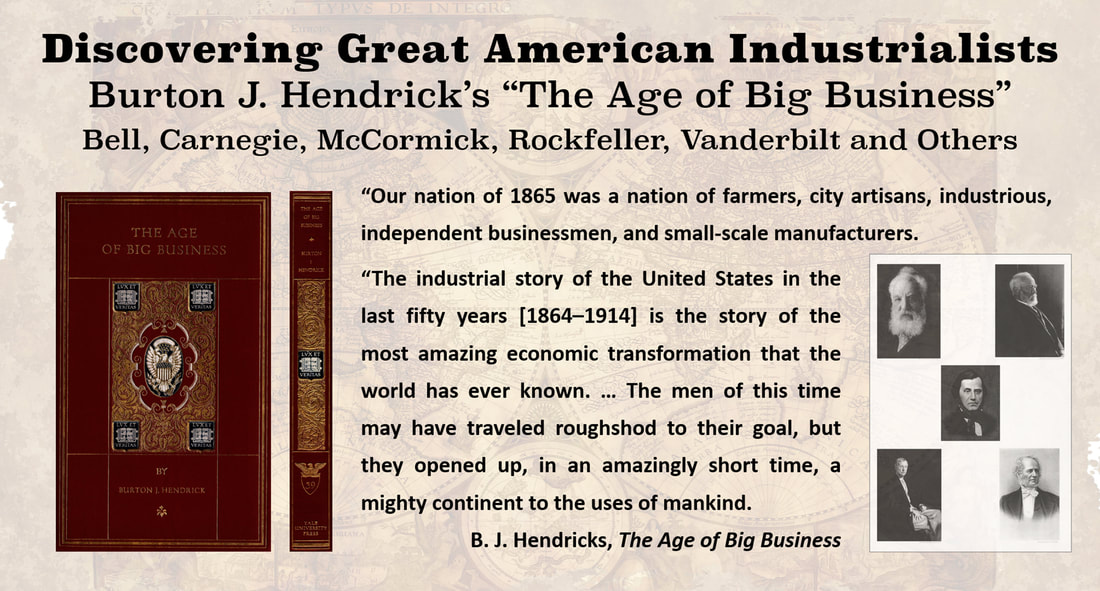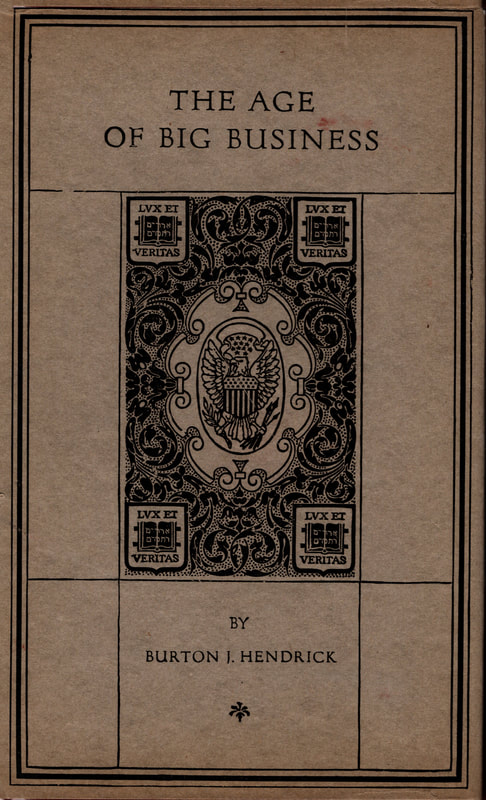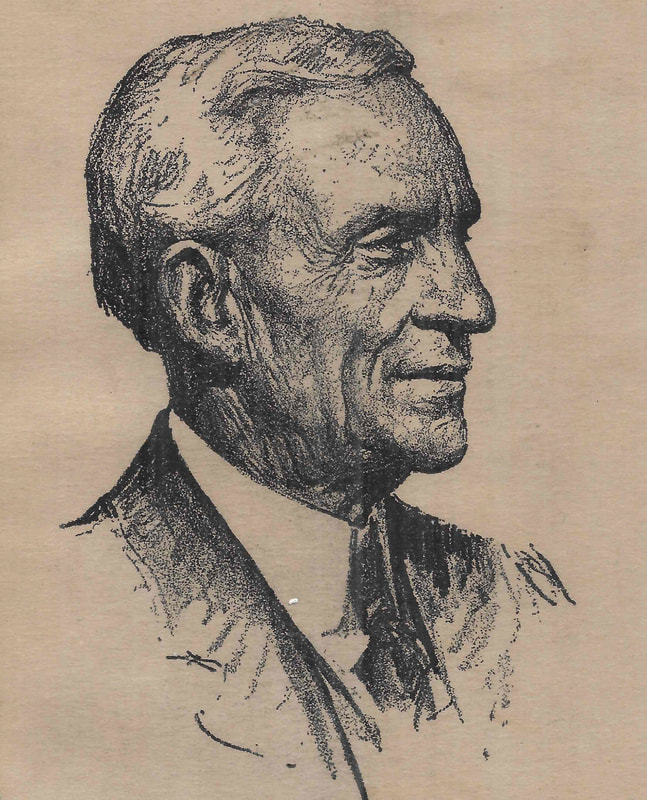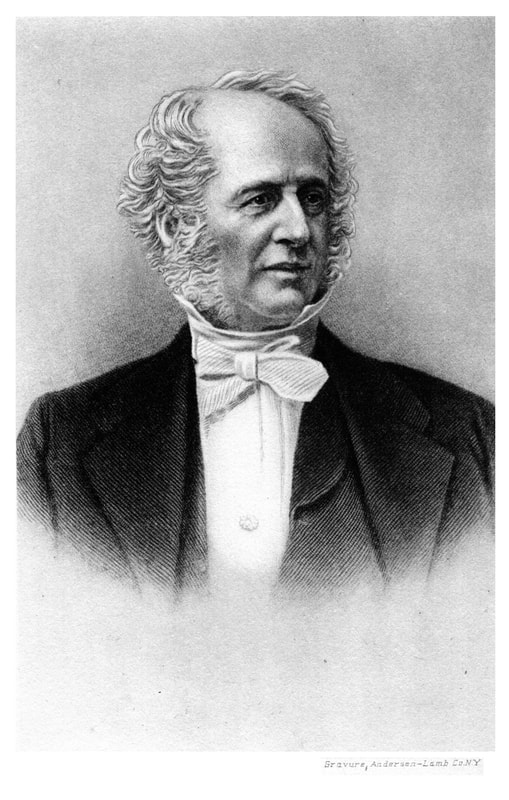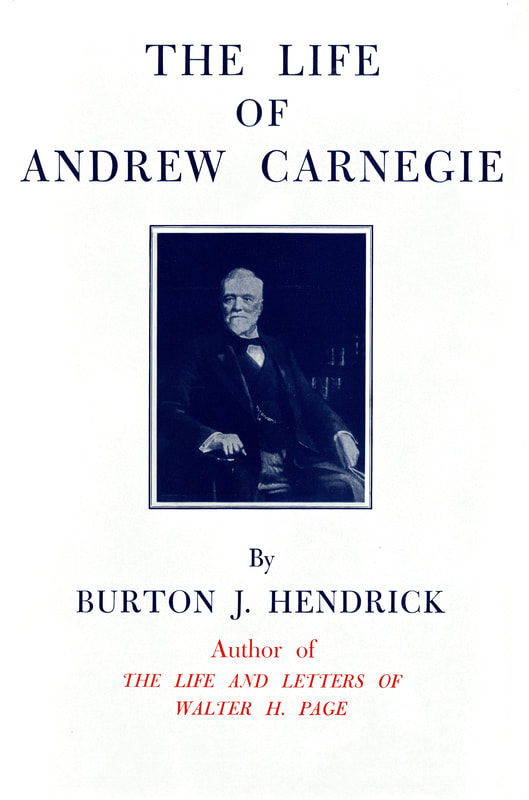A Review of The Age of Big Business by Burton J. Hendrick
- Reviews of the Day: 1919
- Observations of B. J. Hendrick on American Industrialists and Capitalism
- This Author’s Thoughts on The Age of Big Business
Reviews of the Day: 1919
|
“ ‘The Age of Big Business’ deals with the escapades and manipulations of those builders of big fortunes whose operations were so securely—and frequently so shamefully—bound up with politics. If the book is brutally frank, it is also absolutely fair; and if the reader acquires a clear understanding of the ruthlessness that all too frequently was the agency in piling up millions, he also is given a very convincing and interesting picture of the human side of these great masters of high finance: Rockefeller, Carnegie, Frick, Schwab, McCormick … [and others].
“The reader must be hard to please who can willingly, once he has commenced it, put ‘The Age of Big Business’ down without having read straight through to the last page.” “American History,” The New York Tribune, April 12, 1919
|
“To our perhaps uncultured mind, the best book of these Yale histories so far—the most needed, the most interesting—is Burton J. Hendrick’s ‘The Age of Big Business.’ These fragments [about American industrialists] give the nature of the book but not wholly its fascination, part of which is due to a personal portrait here and there and part to the lucidity and honesty of the author.”
“The Age of Big Business,” The New York Herald Sun, March 30, 1919
Observations of B. J. Hendrick on American Industrialists and Capitalism
“Vanderbilt is the most romantic figure in the history of American finance. … In the matter of years [age], his career apparently belongs to the ante-bellum days, yet the most remarkable fact about this remarkable man is that his real-life work did not begin until he had passed his seventieth year.”
“Perhaps McCormick’s greatest achievement is that his machine has banished famine wherever it is extensively used—at least in peace times. Before the [McCormick grain] reaper appeared, existence – even in the United States – was primarily a primitive struggle for bread.”
“Moreover, the automobile illustrates more completely than any other industry the technical qualities that so largely explain our industrial progress. Above all, American manufacturing has developed three characteristics. These are (1) quantity production, (2) standardization, and (3) the use of labor-saving machinery.”
|
- B. J. Hendrick on Henry Ford
|
Henry Ford
|
“Vanderbilt, valuable as were many of his achievements, represented that spirit of egotism that was rampant for the larger part of the fifty years following the [Civil] war. He was always seeking his own advantage and anything worth a moment’s consideration.
“With Ford, however, the spirit of service has been the predominating motive. His earnings have been immeasurably greater than Vanderbilt’s; his income for two years amounts to nearly Vanderbilt’s total fortune at his death; but the piling up of riches has been by no means his exclusive purpose. He has recognized that his workmen are his partners and has liberally shared with them his increasing profits. His money is not the product of speculation; Ford is a stranger to Wall Street and has built his business independently of the great banking interest. He has enjoyed no monopoly, as have the Rockefellers; there are more than three hundred makers of automobiles in the United States alone. |
“Ford has spurned all solicitations to join combinations. Far from asking tariff favors, he has entered European markets and undersold English, French, and German makers on their own ground. Instead of taking advantage of a great public demand [for his automobiles] to increase his prices, Ford has continuously lowered them. Though his idealism may have led him into an occasional personal absurdity, as a business man he may be taken as the full flower of American manufacturing genius.
“Possibly America, as a consequence of universal war [World War I], is advancing to a higher state of industrial organization; but an economic system is not entirely evil that produces such an industry as that which has made the automobile the servant to millions of Americans.”
“Possibly America, as a consequence of universal war [World War I], is advancing to a higher state of industrial organization; but an economic system is not entirely evil that produces such an industry as that which has made the automobile the servant to millions of Americans.”
This Author’s Thoughts on The Age of Big Business
This is my favorite passage from the book. By using the history of Cornelius Vanderbilt as an example, B. J. Hendrick paints a wonderful, dark-and-light portrait of the questionably-dark, business tactics but also the blindingly-light business accomplishments of one of the post-Civil War’s better-known industrialists/capitalists:
|
Cornelius Vanderbilt
|
“Before Vanderbilt’s time a trip to Chicago [from New York] meant that (1) the passenger changed trains seventeen times, and that (2) all freight had to be unloaded at a similar number of places, (3) carted across towns, and (4) reloaded into other trains. … In a few years these roads had been consolidated into a smoothly operating system.
“If, in transforming these discordant railroads into one, Vanderbilt bribed legislatures and corrupted courts, if he engaged in the largest stock-watering operations on record up to that time, and took advantage of inside information to make huge winnings on the stock exchange, he also ripped up the old iron rails and replaced them with steel, put down four tracks where formerly there had been two, replaced wooden bridges with steel, discarded the old locomotives for new and more powerful ones, built splendid terminals, introduced economies in a hundred directions, cut down the hours required in a New York–Chicago trip from fifty to twenty-four, made his highway an expeditious line for transporting freight, and transformed railroads that had formerly been the play things of Wall Street that frequently could not meet their payrolls into exceedingly profitable, high-dividend-paying properties. |
|
“In this operation Vanderbilt typified the era that was dawning—an era of ruthlessness, of personal selfishness, of corruption, of disregard of private rights, of contempt for law and legislatures, and yet of vast and beneficial achievements. The men of this time may have traveled roughshod to their goal, but after all, they opened up, in an amazingly short time, a mighty continent to the uses of mankind.”
B. J. Hendrick does a wonderful job painting in-depth, black-and-white documentaries of our post-Civil War’s greatest industrialists and capitalists. He leaves it up to the reader to decide: If we could go back and change these practices, would we? If we changed things, would we make the country—overall—a better or worse place for its citizens?
In so many ways we live in a greyscale world and Burton Hendrick writes of both the white and black—leaving the greyscale judgements to us—and history. I appreciate this approach: Give the reader the details, both good and bad, and let them think for themselves. I am sure it would make for one lively discussion! Isn’t that the purpose of most prose? Cheers, - Peter E. |
Another recommended work of B. J. Hendrick on Andrew Carnegie:
"The Life of Andrew Carnegie." |
If you enjoy the work of B. J. Hendrick in this anthology, I would also recommend his Pulitzer Prize winning "The Life of Andrew Carnegie." Select the image provided above or select the following link to read a review of this work: B. J. Hendrick on Andrew Carnegie.
